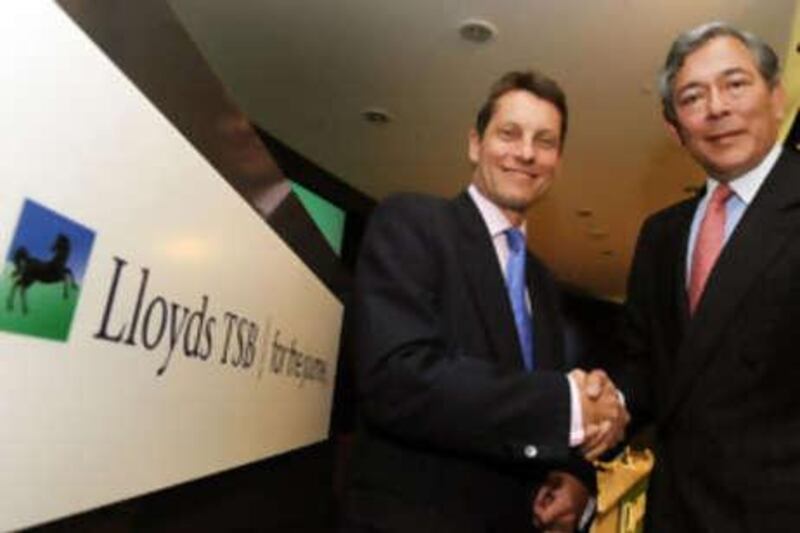LONDON // Britain's Lloyds TSB sealed a £12.2 billion (Dh81.6bn) deal to buy Halifax Bank of Scotland (HBOS) to create a dominant mortgage and savings bank, encouraged by the government amid fears that turmoil in financial markets would claim another UK victim. Lloyds will offer 0.83 of a share for each HBOS share, valuing them at 232 pence based on Wednesday's closing price of 279.75 pence, a 58 per cent premium over HBOS's last price of 147.1 pence.
In early trading in London, HBOS shares were up by a quarter at 184 pence while Lloyds shares dipped three per cent to 268 pence. The bank said it expected the deal to boost annual earnings by more than £1bn a year by 2011 through cost savings, and lift its earnings per share by more than 20 per cent a year. The chief executive of Lloyds, Eric Daniels, will remain as head of the enlarged group and Victor Blank will stay as chairman.
The UK government said it intended to smooth regulatory approval of the takeover, despite the enlarged group having a 28 per cent share of mortgages, to ensure the stability of the UK financial system. Alistair Darling, the chancellor of the exchequer, said he fully supported and welcomed the deal. But Mr Daniels denied it was a government-brokered rescue of its rival and said the banks had been in talks for several weeks.
"There shouldn't be any impression this is a shotgun marriage or a forced marriage - this is something that's been looked at for a good long while," he said. "Our most recent set of conversations have taken place over the last several weeks." Lloyds said the combination would strengthen its ability to service UK customers in difficult markets. It follows a plunge in HBOS's share price in the past six days amid fears about its funding position.
Lloyds's core tier 1 capital ratio, which is a key measure of financial strength, will fall to 5.9 per cent because of the deal. Mr Daniels said he was seeking a ratio of between six and seven per cent and would pay this year's final dividend in shares, establish a new base for the dividend next year and consider asset disposals on top of the cost savings to achieve this. He declined to comment on what assets could be sold, however analysts believe HBOS's Australian arm, Bankwest, could be among them.
Mr Daniels said there would be job cuts, but a suggestion that there could be 40,000 redundancies "sounds very much on the high side". Mr Darling said yesterday that Britain would legislate to modify competition laws to allow the merger to go ahead in the interests of financial stability. Britain's financial supervisory authorities believed such action was appropriate, as the merger between the two banks confirmed earlier yesterday was "in the interests of consumers and the wider economy", he said.
"The current circumstances in the financial markets are truly exceptional. In recent days the financial markets across the world have seen an unprecedented level of uncertainty." The government will change the legislation under Section 42 of the Enterprise Act, which allows it to extend the grounds for considering public interest. "Financial stability had to trump the competition concerns. It was necessary to take decisive action," Mr Darling told the BBC.
Meanwhile, in Brussels the European Commission said it was up to Lloyds and HBOS to check whether they needed to submit their planned merger to EU competition regulators for approval. A spokesman for the EU competition commissioner Neelie Kroes said: "It is up to the parties to verify whether they need to notify to us, or to the authorities in the UK." The commission has the sole power to decide on mergers of a "European dimension". However, if both companies have two thirds of their turnover in a single member state, the competition authorities in that country are empowered to authorise or block the deal. An EU source said no change in European competition rules was being considered as a result of the credit crisis.
* Reuters





